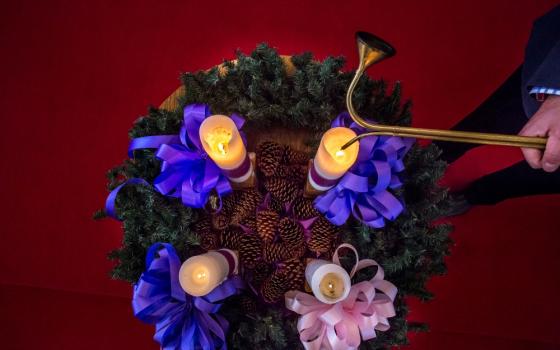It seems silly that in this season of Advent all I have been able to think of is the Easter Vigil. A vision of darkness lit by the tiniest of candles: I recall in my mind's eye the deacon in my home parish pacing back and forth as he preaches. I must have been about 15 years old, and now, a lifetime away from that moment, his words echo in my ears: God works in darkness.
Again and again, I return to these words, the tiny preacher in my head doing laps to remind me God works in the darkness. God must be working in the darkness.
And so I've lit the candles of the Advent wreath in anticipation. I've baked the cookies, hung the lights and trimmed the tree. All the while, I'm conscious of the subtle din of darkness humming in the background, like white noise filling in the prevalent gaps in cheer. Christmas is about lots of things — joy, hope, peace, trust — and this year, surprisingly, brokenness.
Even just a cursory glimpse at the news reveals the deep sense of disruption in the world. Aleppo. Elections. Terror. Assassinations. Upheaval. How could this be? And, what's more, how could this be the world into which we welcome the Christ child?
In a world that seems to be broken, joy and hope can be hard to come by. Hope seems to stand at a door shut in its face as refugees seeking asylum grow weary around the world. Joy loses its freedom when fear, spurred on by hatred and unwillingness to understand, fills common spaces like streets and sidewalks, classrooms and convenience stores. Language is harsher, violence takes root, civility falters and despair festers.
Into this darkness, the Light shines. In a brokenness where anything and everything that defines us seems now to divide us — be it race or creed, sexual orientation or immigration status, political party or socio-economic standing — God steps in. Not to outright heal division, but to embrace it and work within it, so that in our brokenness we might find light and life again.
Our God, after all, is a God of brokenness. That baby born under cover of night, in the lowliest of places, faced insurmountable odds. His parents faced a future that was uncertain, surrendering dreams that had been broken and trusting in promises that were, at best, not so clear.
In that seeming darkness, God worked. And in today's brokenness and darkness, God is working.
That is the promise of faith we trust in.
For all the darkness of Advent, Christmas promises light. It promises us that Christ has come, does come, and will come. We wait for and celebrate something we've already experienced: a moment of revelation . . . of Incarnation. And because we, in some sense, know for what we are waiting . . . the One for whom we are waiting . . . we wait in hope.
Not hope that that coming or this Christmas will be the same, but that things will change. (And that we too will change in the process.) Hope that Love will come down and dwell among us, uniting us in our brokenness and revealing to us that brokenness shared is a blessing that helps to put flesh on God in our midst.
Meditating on the darkness of this season, I've been struck how God uses brokenness to shine through. In the words of the late Leonard Cohen, "Forget your perfect offering / There is a crack, a crack in everything / That's how the light gets in."
A world that is perfect is in no need of a savior, just as people who are perfect have no need for God. Our brokenness, both personal and communal, draws us into relationship. It allows us to see the light in the darkness and to celebrate tiny triumphs of goodness in the world and our lives, while also begging the question of why there is so much suffering in the world.
A God who becomes human knows there is no easy answer to that. Emmanuel stands with us in that suffering and calls for change. "God works in darkness," the tiny preacher in my head repeats.
In the darkness, the wind blew to part the waters of the Red Sea . . . and the people walked through.
In the darkness, a light shined to show wise men and shepherds the way . . . and they chose to follow.
God's work becomes our work — a labor of faith, hope and love.
We rejoice in that work this Christmas, mirroring the light of that first silent night. We rest in the knowledge that we are not alone. Christ comes among us to dwell. No matter how bad the news seems, the Good News — the Word of God-has taken on flesh and entered the brokenness.
Like lanterns in the darkness, we shine forth a love born within: our cracks transformed into guiding lights, pathways to justice and windows open to the world.
[Colleen Gibson is a Sister of St. Joseph of Philadelphia. Author of the blog Wandering in Wonder, she currently serves as assistant director of campus ministry at Chestnut Hill College in Philadelphia.]

